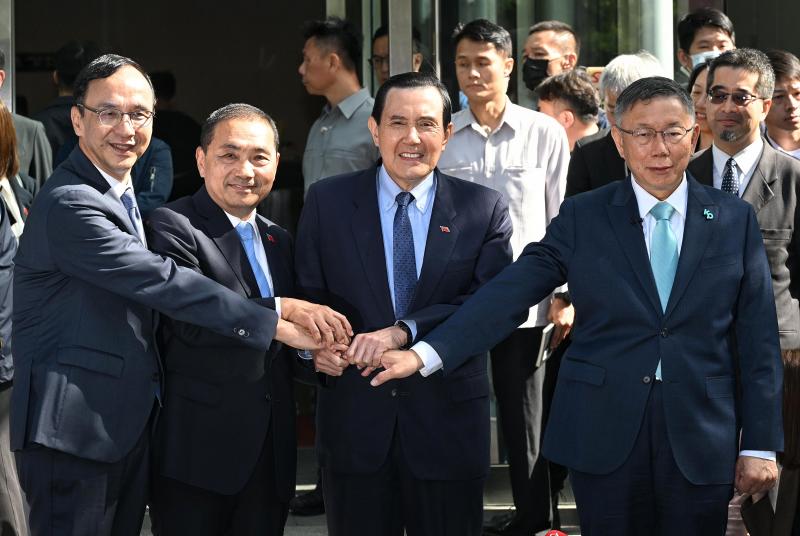The Chinese Nationalist Party (KMT) and Taiwan People’s Party (TPP) on Wednesday agreed to use public polling to decide on a coalition presidential ticket, with the result to be announced on Saturday.
New Taipei City Mayor and KMT candidate Hou You-yi (侯友宜), KMT Chairman Eric Chu (朱立倫) and TPP Chairman and candidate Ko Wen-je (柯文哲) met on Wednesday in a closed-door meeting largely expected to be their last, as they attempt to break a stalemate over who is to represent the opposition on January’s presidential ballot.
The parties met at the Ma Ying-jeou Foundation in Taipei, with former president Ma Ying-jeou (馬英九) serving as a witness.

Photo: Chang Chia-ming, Taipei Times
In a joint statement following the two-and-a-half-hour meeting, the participants said they had agreed to use polling results as the basis of their decision.
Polling experts are to analyze the results of public opinion polls conducted by various organizations between Tuesday last week and Friday, in addition to internal polls conducted by the two parties, they said.
For each poll, if the winner exceeds the statistical margin of error, they are to receive a “point,” they said.
If neither exceeds the margin of error, it would count as a point toward a Hou-Ko joint ticket, they added, remaining vague on the details.
The KMT, TPP and Ma are to each nominate a polling expert of their choice, the statement said, adding that the result would be announced by the foundation on Saturday morning.
After the ballot is decided, the KMT and TPP are to form a joint campaign to assist all candidates of the two parties running in January, it said.
Candidates for the presidential election on Jan. 13 must formally register between Monday and Friday next week.

A magnitude 5.6 earthquake struck off the coast of Yilan County at 12:37pm today, with clear shaking felt across much of northern Taiwan. There were no immediate reports of damage. The epicenter of the quake was 16.9km east-southeast of Yilan County Hall offshore at a depth of 66.8km, Central Weather Administration (CWA) data showed. The maximum intensity registered at a 4 in Yilan County’s Nanao Township (南澳) on Taiwan’s seven-tier scale. Other parts of Yilan, as well as certain areas of Hualien County, Taipei, New Taipei City, Taoyuan, Hsinchu County, Taichung and Miaoli County, recorded intensities of 3. Residents of Yilan County and Taipei received

Taiwan has secured another breakthrough in fruit exports, with jujubes, dragon fruit and lychees approved for shipment to the EU, the Ministry of Agriculture said yesterday. The Animal and Plant Health Inspection Agency on Thursday received formal notification of the approval from the EU, the ministry said, adding that the decision was expected to expand Taiwanese fruit producers’ access to high-end European markets. Taiwan exported 126 tonnes of lychees last year, valued at US$1.48 million, with Japan accounting for 102 tonnes. Other export destinations included New Zealand, Hong Kong, the US and Australia, ministry data showed. Jujube exports totaled 103 tonnes, valued at

BIG SPENDERS: Foreign investors bought the most Taiwan equities since 2005, signaling confidence that an AI boom would continue to benefit chipmakers Taiwan Semiconductor Manufacturing Co’s (TSMC, 台積電) market capitalization swelled to US$2 trillion for the first time following a 4.25 percent rally in its American depositary receipts (ADR) overnight, putting the world’s biggest contract chipmaker sixth on the list of the world’s biggest companies by market capitalization, just behind Amazon.com Inc. The site CompaniesMarketcap.com ranked TSMC ahead of Saudi Aramco and Meta Platforms Inc. The Taiwanese company’s ADRs on Tuesday surged to US$385.75 on the New York Stock Exchange, as strong demand for artificial intelligence (AI) applications led to chip supply constraints and boost revenue growth to record-breaking levels. Each TSMC ADR represents

TRUST: The KMT said it respected the US’ timing and considerations, and hoped it would continue to honor its commitments to helping Taiwan bolster its defenses and deterrence US President Donald Trump is delaying a multibillion-dollar arms sale to Taiwan to ensure his visit to Beijing is successful, a New York Times report said. The weapons sales package has stalled in the US Department of State, the report said, citing US officials it did not identify. The White House has told agencies not to push forward ahead of Trump’s meeting with Chinese President Xi Jinping (習近平), it said. The two last month held a phone call to discuss trade and geopolitical flashpoints ahead of the summit. Xi raised the Taiwan issue and urged the US to handle arms sales to